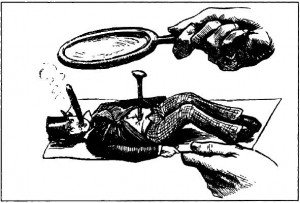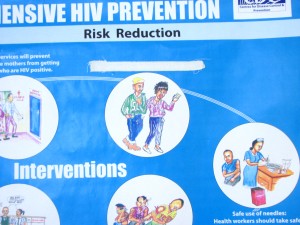I have written before about my disdain for a lot of the pop psychology reported in the press *cough Oliver James*. I am sure that this does not represent a lot of the real research that goes on within the discipline but there does seem to be some fundamental problems within psychology that a few academics are finally shining a light on.
These fundamental problems include the lack of empiricism within the discipline (OK, fancy way of saying you’re making it up) which then feeds into implicit universal assumptions about human behaviour.
The problem with the lack of empiricism in psychology has been approached by Boon and Gozna in an article in The Psychologist which is a broad take on the subject and compares the disciple to other sciences.
 But I was also struck by how much psychological research is based on WEIRD subjects.
But I was also struck by how much psychological research is based on WEIRD subjects.
And by weird, I mean Western, Educated, Industrialised, Rich and Democratic (WEIRD). A fairly recent paper in Behavioural and Brain Sciences (pdf) looked at how behavioural scientists routinely publish broad claims about human behaviour and psychology based entirely on people called Dave and Sarah who live in places like Tufnell Park and Happy Harbor (OK, that one’s where the Justice League hang out) and then assume that they are “standard subjectsâ€*.
*These assumptions are not always made explicit but are often implicitly implied in the article headings and are certainly routinely translated into universal truths by the mainstream media.
The paper compares datasets from different populations and finds that not only is there variation but that WEIRD subjects are also particularly unusual compared to the rest of the species and are frequent outliers.
This has huge implications for the bad science reporting on gender and race.
To be fair I do think the public have a responsibility to think for themselves once in a while and ask themselves one simple question when confronted with a headline such as “Shopping styles of men and women all down to evolution, claim scientists†(don’t worry I’m coming back to this little corker later) and that question should be:
“Is it likely that this is true for all or half of the world’s population?â€
It’s a simple question, not that taxing. But if it seems abstract then lets break it down into manageable bite-size chunks:
a) Is this likely to be true for all** females/males that I know?
b) Is it likely to be true for all** females/males in this country regardless of age, ethnicity, education, intelligence, disability status, social class or background?
c) Is it likely to be true for all** females/males in all nations, cultures, environments, and geo-political regions regardless of age, ethnicity, education, intelligence, disability status, social class or background?
**I’ll even allow for a statistically significant majority here.
If your answer to these questions is ‘Yes, [X] is likely to be true for half the world’s population’ then I’m afraid you lack of the facility of rational thought. I suggest you become a homeopath.
Some interesting points from the Henrich, Heine & Norenzayan paper:
- A recent analysis of the top journals in six sub-disciplines of Psychology from 2003-2007 revealed that 68% of subjects came from the US, and 96% of subjects were from Western industrialised countries, specifically North America, Europe, Australia, and Israel (Arnett, 2008) reflecting the academics country of residence.
- This means that 96% of psychological samples come from countries with only 12% of the world’s population.
- And a randomly selected American undergraduate is more than 4000 times more likely to be a research participant than is a randomly selected person from outside of the West.
I was particularly interested in the section on spatial cognition because I mostly use my catchphrase ‘Oh, fuck off’, when reading about women not being able to read maps. The authors point to the variation in linguistic tools between societies:
Human societies vary in their linguistic tools for, and cultural practices associated with, representing and communicating (1) directions in physical space, (2) the color spectrum, and (3) integer amounts. There is some evidence that each of these differences in cultural content may influence some aspects of nonlinguistic cognitive processes (D’Andrade, 1995; Gordon, 2005; Kay, 2005; Levinson, 2003; Roberson, Davies, & Davidoff, 2000). Here we focus on spatial cognition, for which the evidence is most provocative. As above, it appears that industrialized societies are at the extreme end of the continuum in spatial cognition. Human populations show differences in how they think about spatial orientation and deal with directions, and these differences may be influenced by linguistically-based spatial reference systems.
So spatial cognition may be influenced by linguistic tools, or indeed may be influenced by other factors, but the fact that our research is using such a narrow and biased sample, the conclusions can at best be highly contextualised and at worst hugely flawed.
So if you come across an article saying women can’t read maps because of humans’ hunter-gatherer past (because of course it is always, always because of our hunter-gatherer past), it might be worth considering that other human populations don’t actually use A-Zs or EVEN Googlemaps and indeed wouldn’t describe directions in the same way as those in industrialised societies. So its unlikely that women, half the world’s population, are teh stupids and get themselves all in a tizzy when they have to get themselves somewhere.
I won’t go into the whole article, but it is fascinating so do check it out unfortunately some of their key references are behind a paywall. Grrrr.
 But I was also struck by how much psychological research is based on WEIRD subjects.
But I was also struck by how much psychological research is based on WEIRD subjects. OK, I’m quite late on this one as work has been hellish recently. But here’s the news we’ve all be waiting for – female Viagra has been invented. According to The Sun, it makes
OK, I’m quite late on this one as work has been hellish recently. But here’s the news we’ve all be waiting for – female Viagra has been invented. According to The Sun, it makes 


